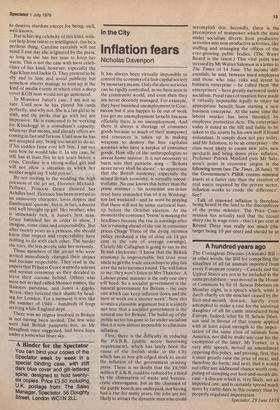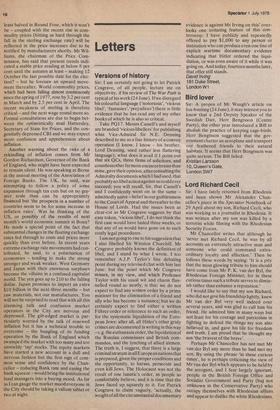In the City
Inflation fears
Nicholas Davenport
It has always been virtually impossible to control the economy of a free capital society by monetary means. Only the slave societies can be rigidly controlled, as we have seen in the communist world, and even then they are never decently managed. For example, they have banished unemployment in Commecon but if you happen to be out of work you get no unemployment benefit because officially there is no unemployment. And there is always a shortage of consumer goods because so much of their manpower and resources is taken up in making weapons to destroy the free capitalist societies who have a surplus of consumer goods. How silly of the anthropologists to invent homo sapiens. It is not necessary to burst into that patriotic song — 'Britons never never shall be slaves' — to appreciate that the British economy, especially the mixed British economy, is virtually uncontrollable. No one knows this better than the prime minister — his economist son-in-law must have reminded him of it in Washington last weekend — and he must be praying that there will not be some statistical bustup before the October election. At the moment the consumer 'boom' is making the headlines because the rise in earnings after tax is running ahead of the rise in consumer prices (Stage Three of the dying incomes policy produced a rise of close on 14 per cent in the rate of average earnings). Clearly Mr Callaghan is going to say to the British electorate: 'I know that the British economy is ungovernable but trust your uncle to get the trade union boys to play fair over the next incomes round. The will listen to me; they won't listen to Mrs Thatcher. A Labour prime minister is the only one they will heed. So a socialist government is the natural government for Britain — the only one which can keep inflation down and the men at work on a shorter week'. Now this _ sounds a plausible argument but it is simply not true that a socialist government is the natural one for Britain. The build-up of the public sector has gone so far under socialism that it is now almost impossible to eliminate inflation. First, there is the aifficulty in reducing the P.S.B.R. (public sector borrowing
requirement), which has lately been the cause of the foolish strike in the City which has to buy gilt-edged stock to avoid the inflation of the government printing press. There is no doubt that the £8,500 million P.S.B.R. could be reduced by a third by the elimination of waste and bureau cratic extravagance, but as the chairmen of the public boards are underpaid, not having had a rise for many years, the jobs are not likely to attract the dynamic men who could
accomplish this. Secondly, there is the preemption of manpower which the state under socialism diverts from productive activities into non-productive activities, like staffing and managing the offices of the ever-growing public bodies. (The Water Board is the latest.) This vital point was stressed by Mr Walter Salomon in a letter to The Times of 14 June. The income differentials, he said, between hired employees and those who take risks and invest in business enterprise — he called them 'the enterprisers' — have greatly narrowed under socialism. Penal rates of taxation have made it virtually impossible legally to enjoy an appropriate benefit from starting a new business enterprise. At the same time the labour market has been throttled by employee protection Acts. The enterpriser today is taxed to the hilt and liable to be taken to the courts by his own staff if found redundant. It simply does not pay today, said Mr Salomon, to be an enterpriser — the class most likely to create new jobs, new products and bring down price inflation. Professor Patrick Minford puts Mr Salomon's point in economic jargon in the following terms (see The Times, 26 June). 'If the Government's PSBR creates nominal assets at a faster rate than the creation of real assets required by the private sector, inflation works to erode the difference'. See?
Talk of renewed inflation is therefore being heard in the land to the discomfiture of the prime minister. The Price Com
mission has actually said that the recent sharp rise in wage costs — that 14 per cent in Round Three was really too much (the target being 10 per cent) and should be at
least halved in Round Four, which it won't be — coupled with the recent rise in commodity prices (hitting us hard through the fall in the sterling exchange rate) will be reflected in the price increases due to be notified by manufacturers shortly. Mr Williams, the chairman of the Price Commission, has said that present trends indicated a stable price reading at below 8 per cent until the autumn at least — making 12 October the last possible date for the election? — but he foresaw an upward movement thereafter. World commodity prices, which had been falling almost continuously since the spring of 1977, rose by 3.2 per cent in March and by 2.5 per cent in April. The recent weakness of sterling is therefore critical — and the next wage round more so. Formal consultations are due to begin between the optimistically mad Hattersley, Secretary of State for Prices, and the congenitally depressed CBI and we may expect more confusion and apprehension about inflation.
Another warning about the risks of a rekindling of inflation comes from Mr Gordon Richardson, Governor of the Bank of England, who might have been expected to remain silent. He was speaking at Berne at the annual meeting of the Association of Foreign Banks. The UK, he said, was attempting to follow a policy of some expansion through tax cuts but on no greater scale than can be appropriately financed but 'the prospects in a number of countries seem to be for some increase in inflation rates'. Was he thinking of the US, or possibly of the results of next month's world economic summit at Bonn? He made a special point of the fact that substantial changes in the floating exchange rates fed through to costs and prices more quickly than ever before. In recent years extreme exchange rate movements had contributed, he said, to a polarisation of economies — tending to make the strong stronger and weak weaker. West Germany and Japan with their enormous surpluses become the villains in a confused capitalist world. The yen goes up to 210 to the falling dollar. Japan promises to import an extra $10 billion in the next three months — but raw materials, not our manufactures. You will not be surprised to read that with all this alarming talk and confusion market operators in the City are nervous and depressed. The gilt-edged market is particularly worried by the talk of renewed inflation but it has a technical trouble to overcome — the bungling of its funding operation by the Bank of England which swamped the market with too many and too unwieldy 'tap' stocks. The equity markets have started a new account in a dull and nervous fashion but the first sign of common sense and confidence by the Chancellor — reducing Bank rate and easing the bank squeeze —would bring the institutional fund managers into a buying mood. As far as I can gauge the market mood everyone in the City should be taking a valium tablet or two at night.







































 Previous page
Previous page